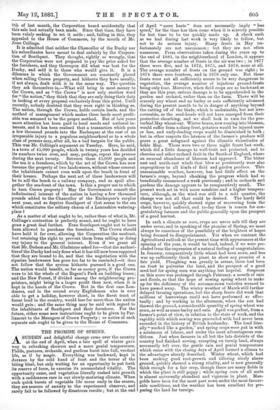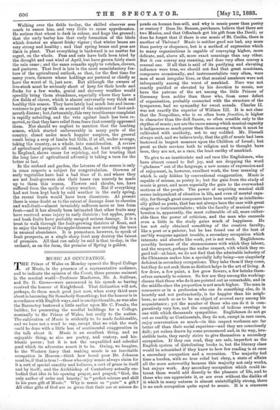THE PROMISE OF SPRING.
Ti SUDDEN and delightful change came over the country
at the end of April, when a late spell of winter gave way to refreshing showers and a more genial temperature. Fields, pastures, orchards, and gardens burst into full, verdant life, as if by magic. Everything was backward, kept in durance by the cold hand of frost and the terror of the biting blast, but only waiting for an opportunity to put forth its reserve of force, to exercise its accumulated vitality. The opportunity came, and vegetation literally rushed into growth with a suddenness rare in our slowly-maturing climate. When such quick bursts of vegetable life occur early in the season, they are sources of anxiety to the experienced observer, and rarely fail to be followed by disastrous results ; but at the end
of April "more haste" does not necessarily imply "less speed," for the time has then come when it is scarcely possible for lost time to be too quickly made up. A check such as we had during last week is very likely to follow, but not to do serious injury. Sharp frosts in May un- fortunately are not uncommon • but they are not often numerous. From observations taken during the years up to the end of 1881, in the neighbourhood of London, it appears that the average number of frosts in the air was two ; in 1877 there were five, and in 1872, 1875, and 1878, none at all. The average number of frosts on the ground was eight ; in 1874 there were fourteen, and in 1878 only one. But these frosts were not all sufficiently severe to be very dangerous to vegetation, the average number of injurious ground-frosts being only four. Moreover, when field crops are as backward as they are this year, serious damage is to be apprehended in the garden and orchard, rather than on the farm. There will be scarcely any wheat and no barley or oats sufficiently advanced during the present month to be in danger of anything beyond the cutting off of the blade, which is undesirable, but not irre- coverable, as the seed-heads will not have emerged from their protective sheathing, and we shall look in vain for the pro- verbial May wheat-ear. Winter beans, now coming into blossom, would suffer from a sharp frost, potatoes would be injured more or less, and early-feeding crops would be diminished in bulk ;- but in other respects the lateness of the farmer's produce will prove a great safeguard against the climatic vicissitudes of fickle May. There were two or three night frosts last week, which did a little damage to wall-fruit not protected, and to cherries and other orchard fruit in the South of England, where an unusual abundance of blossom had appeared. The bitter east and north-east winds that blew so persistently were also. unpropitious to all kinds of field and garden produce. This unseasonable weather, however, has had little effect on the farmer's crops, beyond checking the progress which had so beneficially commenced a week previously ; and in orchards and gardens the damage appears to be comparatively small. The
present week set in with more sunshine and a higher tempera- ture, although, as the wind was still in a cold quarter, the was not all that could be desired. The hardy field crops, however, quickly showed signs of recovering from the check they had suffered, and to-day there is reason for con- gratulating farmers and the public generally upon the prospect of a good harvest.
In such a climate as ours, crops are never safe till they are under cover, and in speaking of the promise of Spring, we must always be conscious of the possibility of the brightest of hopes being doomed to disappointment. Yet when we contrast the Agricultural outlook at the present time with appearances at the opening of the year, it would be hard, indeed, if we were pre- cluded from the expression of a natural feeling of congratulation. In January, comparatively little wheat had been sown, and less was up sufficiently thick in plant to show any promise of a fair yield. Ploughing was greatly in arrear, there had been no frost to pulverise the land, and the prospect of a good seed-bed for spring corn was anything but hopeful. Suspense on this score was prolonged through February, a month of rain and floods, so that the hope of sowing spring wheat to make up for the deficiency of the autumn-sown varieties seemed to have passed away. The wintry weather of March still further delayed farming operations, but the sharp frosts did work that millions of harrowings could not have performed so effec- tually; and by working in the afternoon, when the sun had thawed the ground, a considerable quantity of spring wheat was sown, as well as some barley and oats. April was perfect, from a farmer's point of view, in relation to the state of work, and the rapidity with which sowing was proceeded with had never been. exceeded in the history of British husbandry. The land liter- ally "worked like a garden," and spring crops were put in with a minimum of labour, and under the most advantageous con- ditions. Just when farmers in all but the late districts of the country had finished sowing, excepting on turnip land, always necessarily left over, the gentle rain and genial temperature which came with the closing days of April formed a climax to the advantages already described. Winter wheat, which had been making good root-growth and tillering nicely above ground, quickly showed a strong vitality, and is now generally thick enough for a fair crop, though there are many fields in which the plant is still gappy ; while spring corn of all sorts is almost universally abundant and vigorous in plant. Man- gold(' have been for the most part sown under the most favour- able conditions and the weather has been excellent for pre- paring the land for turnips. Walking over the fields to-day, the skilled observer sees much to assure him, and very little to cause apprehension. He notices that wheat is dark in colour, and hugs the ground ; that the early barley has that curly formation of the blade which denotes an almost frisky vigour ; that winter beans are very strong and healthy ; and that spring beans and peas are thick in plant. That everything is backward is no matter for regret, on the whole. Peas and oats have both been tried by the drought and east wind of April, but have grown fairly since the rain came ; and the same remarks apply to vetches, clovers, and pastures. That feed is late is the most unsatisfactory fea- ture of the agricultural outlook, so that, for the first time for many years, farmers whose holdings are pastoral or chiefly so have the worst of it, just now. But although the owners' of live-stock must be seriously short of keep for their herds and flocks for a few weeks, genial and showery weather would speedily bring them abundance, especially where they have a few fields of clover, which is almost universally very thick and healthy this season. They have lately had much loss and incon- venience to put up with on account of the existence of foot-and- mouth disease; but, fortunately, this very troublesome complaint is rapidly subsiding, and the veto against lamb has been re- moved, so that they have relief from fears that recently oppressed them. Nor should we neglect to mention that the lambing season, which started unfavourably in many parts of the country, closed under much happier auspices, the general result being a crop of lambs but little, if at all, under average, taking the country, as a whole, into consideration. A review of agricultural prospects all round, then, at least with respect to England, shows cause for rejoicing, and for trusting that the long lane of agricultural adversity is taking a turn for the better at last.
In the orchard and garden, the lateness of the season is only in some respects a subject for congratulation. Growers of early vegetables have had a bad time of it, and where they are not fruit-growers also their losses can scarcely be made up to them this season. Flowers and shrubs, too, have suffered from the spells of wintry weather. But if everything had not been kept back by cold weather in the early spring, the recent frosts would have been disastrous. At present there is some doubt as to the extent of damage done to cherries and wall-fruit—almost invariably sufferers more or less from frost—and it has already been intimated that other fruits may have received some injury in early districts ; but apples, pears, and bush fruits have probably escaped serious damage. It is a treat to walk through the fruit-growing districts of Kent, and to enjoy the beauty of the apple-blossom now covering the trees in unusual abundance. It is premature, however, to speak of fruit prospects, as a single sharp frost may destroy the fairest of promises. All that can safely be said is that to-day, in the orchard, as on the farm, the promise of Spring is golden.



































 Previous page
Previous page